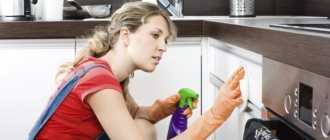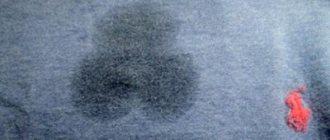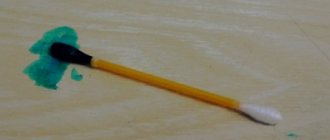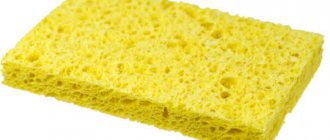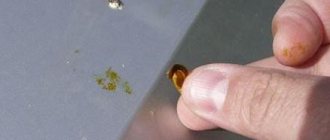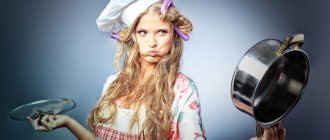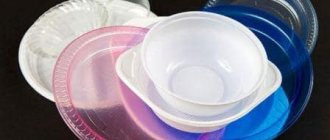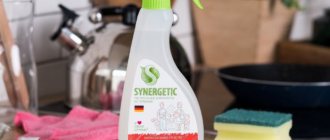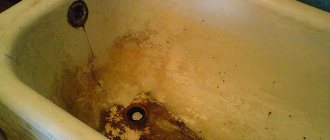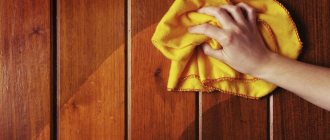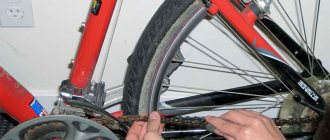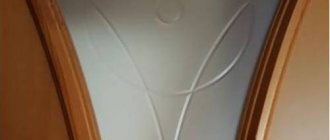Cleaning appliances is not the most enjoyable thing you can do in the kitchen. Fortunately, the modern chemical industry is ready to offer effective means for getting rid of dirt, carbon deposits and grease. Thus, the process of creating cleanliness and comfort takes a minimum of time and effort.
Photo: Pixabay.com
The formulas of such products are supplemented with a composition of surfactants, antibacterial and alkaline components. Ultimately, the main task of such chemistry is the high-quality breakdown of fat.
According to the form of release, cleaning products for stoves and ovens can be:
- Liquid, in the form of a spray.
They guarantee economical distribution, proper dosage and quick results. But they require great caution on the part of the user, because if they come into contact with the skin and respiratory organs, they can cause burns and allergies. - Cream or gel
- placed in jars with a narrow neck and a hinged cap. They are distributed evenly and act quickly enough. However, in some cases, it is difficult to remove from surfaces.
When choosing the best option, it is worth considering the manufacturer’s recommendations regarding acceptable materials. For example, many of the modern “jars” can damage aluminum or wood coatings. In addition, you need to pay attention to:
- Tube volume.
- Convenient dispenser.
- Optimal holding time.
- Possibility of use indoors with children and animals. As a rule, this is the prerogative of environmentally friendly compounds.
Introducing the rating of stove and oven cleaners 2022. The best 15 products that were selected by our experts based on user reviews and ratings.
| Rating (2021) | Prices, ₽ | A country |
| The best effective stove and oven cleaners | ||
| 1. Attitude | from 590₽ | Canada |
| 2.Dr. Beckmann | from 230₽ | Germany |
| 3. Shumanit Bagi | from 220₽ | Israel |
| 4. | from 330₽ | Netherlands |
| 5. Frosch Soda | from 190₽ | Germany |
| 6. Express Sanita | from 170₽ | Russia |
| 7. Gold Unicum | from 120₽ | Russia |
| 8. Mr. Cheester | from 130₽ | Russia |
| 9. Citrus energy Mr. Muscle | from 160₽ | Russia |
| 10. Azelit GraSS | from 100₽ | Russia |
| 11. Domestos | from 100₽ | Russia |
| The Best Eco-Friendly Stove and Oven Cleaners | ||
| 1. Zero% grape vinegar, with menthol | from 140₽ | France |
| 2. Anti-grease Meine Liebe | from 170₽ | China |
| 3. Bio-Cleaner with Lemongrass essential oil BioMio | from 140₽ | Russia |
| 4.Synergetic | from 120₽ | Russia |
General recommendations
Follow these tips:
- Wipe off greasy drops immediately so they don’t have time to dry.
- Test the detergent on a small area first. Treat the surface with the composition, wipe and check the color of the coating after a couple of minutes.
- Do not use harsh abrasives such as powder, otherwise you will damage the top layer of wood or painted surfaces.
- Use soapy water, baking soda, and salt to clean the fittings. Do not use vinegar, alkalis, citric acid or hydrogen peroxide to avoid damaging the metal.
- At the end of cleaning, wipe the kitchen with a damp and dry microfiber cloth - this will remove any remaining cleaning product and stains.
The Best Creamy Kitchen Grease Cleaners
Creamy products are easily applied to the surface, effectively removing fat. Due to their thick structure, they last for a long time.
Universal cream Sanita
A universal product that copes with grease on metal, glass-ceramic, and enamel surfaces in the kitchen. It consists of 30% natural ingredients that gently but efficiently fight fat deposits, soot, scale, and rust. The effectiveness of the cream is increased due to the 5% soda content.
The thick cream spreads well over the contaminated area and is removed without residue, marks or streaks. The product with a pleasant citrus aroma fights unpleasant odors, maintaining a feeling of cleanliness for a long time. The bottle has convenient recesses for your hands, which allows you to apply the product precisely.
Advantages:
- Cleaning without scratching the coating;
- Suitable for any hard surfaces;
- Contains abrasive natural micro granules;
- Pleasant citrus aroma;
- Leaves no marks after drying.
No deficiencies found.
Nordland Cleansing Cream
An environmentally friendly, biodegradable German product for cleaning the kitchen from dirt and grease, which is not harmful to the environment and humans. It is used to clean glass-ceramic, uncoated metal and enameled surfaces. The cream dissolves remaining food and fat in minutes. The composition contains marble powder, which does not damage the surface, effectively removing dirt. After rinsing, there are no streaks or white spots left.
Due to the thick structure, the product consumption is minimal. The unobtrusive aroma does not irritate sensitive people. Removes dirt from ovens, microwaves, stoves.
Advantages:
- Gentle surface cleaning the first time;
- 100% biodegradable;
- Has antibacterial properties;
- Economical consumption.
No deficiencies identified.
Cream Shumanit Delicate Bagi
A highly concentrated Israeli cream that instantly removes grease, plaque, and the remains of burnt food in the kitchen. The product polishes, adding shine to the coating, and copes with germs and unpleasant odors. Suitable for metal, glass-ceramic, ceramic, plastic, stone surfaces.
It has economical consumption - one drop removes grease from a gas or electric stove in the kitchen, instantly breaking down contaminants. After removing the product, there are no streaks or white marks left on the surface. Glossy items, such as cutlery, develop a mirror-like shine.
Schumanite can be used to clean not only the kitchen, but also the bathroom. It tackles stubborn stains effortlessly. One 350 ml can will clean a large area.
Advantages:
- Concentrated product;
- Cleaning any surfaces;
- No smell;
- Antimicrobial properties;
- Environmentally friendly product.
No deficiencies were identified.
Features of processing different facades
For the manufacture of kitchen furniture, MDF, chipboard, wood, plastic and glass are used. When cleaning, it is important to take into account the characteristics of each material and know how to wash the kitchen set so as not to spoil the color or texture of the surface.
MDF and chipboard
Do not use abrasives or harsh scourers to remove grease from glossy MDF. They leave scratches and spoil the appearance of the headset. Clean the gloss with gentle detergents and soft cloths. To add shine, rub the coating well with paper towels after cleaning.
Clean chipboard with a melamine sponge, alcohol, soapy water and vinegar. The laminated surface can be cleaned with dishwashing gel.
Tree
This is the most difficult material to clean, as it requires delicate care. To remove grease and other contaminants, use professional wood chemicals and soft, lint-free wipes. Do not use peroxide, ammonia, citric acid or other products containing alkali.
After cleaning, do not forget to wipe all surfaces dry. Treat them with polish or wax to protect them from dust.
Plastic
An easy-to-maintain material that withstands moisture well. But some products cannot be used for cleaning. For example, you should not clean plastic facades with aggressive solvents, acetone or chlorine - these compounds discolor the surfaces and lead to tarnishing. It is worth avoiding abrasives: the material is very soft, so it is easy to scratch.
To clean plastic from grease, use dishwashing and glass cleaners. To remove old stains, you will need stronger cleaning products: special pastes, gels and sprays.
Glass
To clean glass facades, avoid products based on alkali, soda and salt. Do not use powders or hard brushes to avoid leaving scratches. Use alcohol-containing compounds: they remove grease perfectly and do not form streaks.
Cleaning products for toilet and bathroom
The bathroom and toilet are the “wet zones” of the apartment. Hard water promotes the formation of limescale on tiles and plumbing fixtures, and waterlogged air creates favorable conditions for the development of mold. In the knee, on the inner walls and under the rim of the toilet bowl, colonies of microorganisms quickly multiply, which, together with small drops, fall on the surrounding surfaces every time you press the flush button.
Bath and shower
To maintain hygienic and visible cleanliness in the bathroom, you will need acid gels or sprays. Acids dissolve limescale, remove rust stains and smudges, and destroy pathogenic microorganisms.
The degree of impact of “acid agents” on pollution depends on the pH level (0-6). Strong acidic agents (pH 2-3) dissolve water stone and rust, weaker acids (pH 4-5) cope with the removal of relatively “fresh” deposits of hardness salts. The recommended duration of exposure is 15-30 minutes.
Effective acid products for bathtubs and shower trays:
- Gloss Anti-Plaque,
- Akrilan,
- Sanox "Clean Bath"
- Unicum for acrylic surfaces,
- Amway Home,
- Mr. Chister.
The glass walls of the shower stall can be cleaned with mildly acidic bath products, glass cleaners and special products - for example, Mellerud or Frosh Green Grapes. The recommended duration of exposure is 5-15 minutes.
Read the blog:
FAQ on cleaning products: how to remove limescale and rust in an apartment
How to clean limescale from a shower stall
Rust in the bathtub: how and with what to clean it without harming the coating
Order cleaning in St. Petersburg and Leningrad region
Toilet
Limescale deposits and rust in the toilet bowl can be removed with any bath acids with a pH of 2-5 or specialized products with disinfectant components. Sanitary ware, unlike acrylic coatings, is not afraid of long-term contact with strong acids, so you can safely increase the exposure time of the product to 2-3 hours to dissolve particularly stubborn contaminants in the knee or tank.
Popular toilet cleaners:
- Sanoks,
- Toilet Duckling 5-in-1,
- Domestos Anti-rust and Anti-plaque.
Read the blog:
How and with what to remove limescale deposits in the toilet: clean the tank, bowl and elbow
Tiles in “wet” areas
Ceramic tiles in the bathroom can be cleaned of limescale using gentle bath acids, glass cleaners or special products. Acids corrode tile joints, so gels and sprays must be applied carefully only to the wall covering.
Mild bathroom tile cleaners:
- Gloss Anti-plaque,
- Acrylan for bathrooms,
- Spray glass cleaner Clean Glass,
- Zero spray for plaque removal.
Read the blog:
How to clean limescale on bathroom tiles.
Folk remedies
Some available products effectively deal with fat, but their effect should be checked before processing. They are more budget-friendly than professional cleaners, but only deal with minor stains.
Soda
Quickly and safely removes grease from furniture and is suitable for almost any material.
Mode of application:
- mix baking soda and water in a 2:1 ratio to a creamy consistency;
- apply the mixture to the stained area;
- lightly rub into the surface;
- wash off the residue with a damp sponge after 15 minutes.
The effect of soda will be enhanced by salt. Take both ingredients in equal quantity and add a little water. Apply generously to dirty areas and rinse after 25 minutes.
Salt
This recipe will help remove grease from plastic surfaces. Dissolve 20 g of table salt in a liter of heated water. Soak a cotton rag in the saline solution and wipe down the dirty furniture. if the dirt does not come off, repeat the procedure 2-3 times.
Ammonia
You can remove greasy deposits from kitchen cabinets using ammonia. Dissolve 20 ml of ammonia in a liter of water. Treat contaminated areas: use a spray bottle to do this. After 20 minutes, wipe with a damp sponge. When working with ammonia, do not forget to wear gloves and be sure to ventilate the room after cleaning.
Vinegar
Spray the surface with vinegar using a spray bottle. Sprinkle baking soda on top of the stains. When the active reaction is over, wipe the surface with a damp cloth.
Do not use vinegar on painted surfaces. It can corrode the paint or make the color fade.
Mustard powder
This product is suitable for cleaning facades, electric stoves and refrigerators. Wet the sponge and wipe the problem areas. Then cover the grease stains with mustard powder. After 3-5 minutes, remove any remaining dirt with a clean, dry cloth.
Do not use mustard powder to clean wooden furniture and MDF, as such furniture does not have a protective surface.
Laundry soap
Soap will gently remove grease from any surface. Cleaning algorithm:
- grate half the block on a coarse grater;
- pour in a couple of tablespoons of water;
- apply the mixture to the stains;
- sprinkle soda on top;
- rub the surface with a sponge dipped in warm water;
- leave for 15 minutes;
- Remove any remaining moisture with a clean, dry cloth to prevent dust and new dirt from settling.
Lemon juice and citric acid
Lemon removes fresh grease stains and leaves a pleasant citrus aroma. Cut a couple of lemon slices and rub them on the problem areas. After 25 minutes, soak a clean sponge in warm water and remove any remaining juice and dirt. Wipe the set dry with a paper towel.
If the stains are stubborn, it is better to use citric acid in combination with dishwashing gel. Proceed as follows:
- dilute 15 g of acid in 1 liter of water;
- add five drops of detergent;
- mix and apply to dirty areas with a spray bottle;
- After 40 minutes, when the product breaks down the fat, wipe the surface with a damp sponge.
Citric acid is suitable for cleaning all types of dirt. The product is safe for any furniture except wood, as well as kettles, refrigerators and stoves.
Hydrogen peroxide
Combine peroxide and soda in a 1:2 ratio. Apply the mixture liberally to areas with dirt. After 20 minutes, wipe the surface with a clean cloth. If you don't have soda, you can replace it with table salt.
Do not apply peroxide to dark furniture: the solution has a bleaching effect and will ruin the surface.
Melamine sponge
The product removes old stains of grease and soot. To clean the set, soak the sponge in running water, wring it well and wipe the furniture. The sponge crumbles, so after the procedure you need to wipe the area with a rag.
Do not use melamine sponge to clean interior cabinets, drawers and shelves. Keep it out of the reach of children and animals, as melamine rubber fibers will be harmful if ingested.
Dishwashing liquid
The gel is safe for painted surfaces. Dilute it with water in a ratio of 2:1 and stir to form foam. Treat dirty areas with the mixture. After five minutes, wipe with a dry cloth. If the kitchen set is white, then add 10 drops of hydrogen peroxide to the gel.
Compound
Most kitchen cleaning products contain surfactants (surfactants). They are chemical components that are capable of breaking down particles of fat and dirt at the molecular level.
They have a different nature of origin and specificity, according to which they are divided into the following types:
- Anionic – act as emulsifiers and have a washing effect;
- Cationic ones are less aggressive, but do not have a cleaning effect. Needed for disinfection and treatment against bacteria;
- Nonionic – safe substances that have different effects on pollution.
Also in the composition you can find such elements as soda, water, organic vegetable soap, antibacterial oils, stabilizers, aloe extracts or glycerin, flavors and fragrances, dyes, foaming agents.
The composition of fixed assets is approximately the same. It is necessary to ensure that the composition does not contain the following dangerous components: phenols, cresols, formaldehyde, phosphates, ammonia, nitrobenzene, petroleum distillates. These substances are hazardous to health and can cause allergies, irritation of mucous membranes or respiratory diseases.
Special means
If folk remedies do not help, buy professional chemistry. Most cleaning formulas are formulated for specific materials, so they remove even stubborn stains gently and safely.
Amway Home Kitchen Cleaner
Liquid product for combating fresh dirt, old grease and soot. Country of origin: Belgium. Suitable for all surfaces except wood, marble and stone. Contains no chlorine, alkalis or caustic acids. Directions for use: mix the concentrate with water in a ratio of 1:3, apply to dirt using a spray bottle. Price for a 500 ml bottle from 500 rub.
Grease remover Bagi Shumanit
Spray to remove congealed fat, carbon deposits and soot. Country of origin: Israel. Suitable for cleaning stoves and grills, hoods, kitchen aprons, pots and pans. Cannot be used on aluminum, Teflon or painted surfaces. Directions for use: apply the product to the contaminated surface, leave for 30–60 seconds. Wipe with a damp cloth and rinse with water. 400 ml of spray is enough for about 100 cleanings. Price from 400 rub.
Cillit Bang Anti-grease
Spray for removing burnt food and oil stains. Country of origin: Russia. Suitable for difficult surfaces, including marble and natural stone, but cannot be used on wooden furniture. Directions for use: spray the spray onto the contaminated surface and leave for 5 minutes. Then wipe with a sponge and rinse with a wet cloth. A 750 ml bottle costs from 200 rubles.
Mr Muscle Kitchen Expert
Spray to get rid of burnt fat, oil splatters and dried sauce stains. Country of origin: the Netherlands. Harmless to any furniture, sinks and stoves. Directions for use: spray the liquid, leave for 30 seconds and remove with a damp cloth. If the surface is wood, painted or aluminum, rinse off immediately. A 500 ml bottle costs from 250 rubles.
What to choose for the floor?
When cleaning kitchen floors, it is recommended to choose products that combine high-quality cleaning and disinfection , but do not have a strong lingering odor.
Mr. Proper Washing liquid
The product is suitable for cleaning floors and walls in the kitchen.
Advantages:
- No need to rinse off.
- Universal.
- Removes odors.
- Concentrated form.
- Cope with stubborn dirt.
- Light fresh scent.
- Removes grease and stains.
- Gives shine.
- The product can also be used to clean kitchen work surfaces.
- Effective even in cold water.
Cons: You may not like the smell. Price – up to 100 rubles per 0.5 liter. Read reviews here, here and here.
EasyWork
The concentrated product is intended for cleaning floor coverings efficiently and without streaks.
Pros:
- concentrated form;
- no need to rinse off;
- price.
Flaws:
- strong odor – contains fragrance;
- there are dyes;
- does not always cope with severe pollution;
- not convenient packaging.
Price: up to 400 rubles for 5 liters. Read reviews here.
Bagi Oranit
The product is intended for cleaning all types of floors.
Advantages:
- Does not require rinsing.
- Antistatic effect.
- Safely.
- Suitable for various coatings.
- Does not leave streaks.
- Concentrate.
- Dense form.
- Economical consumption.
- For manual cleaning.
Flaws:
- price;
- smell.
Cost – up to 1,000 rubles per 3 liters. Read reviews here, here and here.
Prevention of kitchen contamination
To prevent grease stains from eating into the surface, follow these rules:
- turn on the hood while cooking;
- wipe the facades with a damp sponge and detergent every day;
- maintain average humidity in the kitchen;
- do not touch handles and cabinets with dirty hands;
- polish wooden facades with a cotton cloth twice a week;
- Order maintenance cleaning from professionals with washing of the refrigerator, stove and microwave, cabinets and countertops.
Special equipment
For cleaning the kitchen, special detergents for washing kitchen furniture are suitable. “Special” means intended exclusively for the materials from which kitchen sets are made. Therefore, before you grab the first cleaning product you come across from the store shelf, it’s worth finding out what your kitchen cabinets are made of.
Most often, kitchens are made of MDF - wood fiber boards, which are covered with a protective film or plastic on top. This material is most vulnerable to aggressive substances containing acid, chlorine or ammonia. Also, do not rub MDF with detergents containing abrasive materials.
MDF kitchen
You should be careful with varnish coatings and unprotected wood panels. Varnish is corroded by many active substances, and wood that is not covered with protective materials quickly absorbs moisture and becomes deformed.
Before purchasing a product, you should carefully study the composition and recommendations. Appropriate products are suitable for glass or metal surfaces. Vulnerable, delicate materials should be cleaned with liquid, foaming, gel-like substances using soft fiber cloths and sponges.
From household chemicals for cleaning furniture in the kitchen, you can choose the following products:
- liquid dishwashing liquid (for example, “Fairy”);
- gel-like with a soft structure and non-aggressive composition, specially designed for wet cleaning (for example, the “Komet” universal gel);
- concentrated for cleaning furniture, which require dilution in water (for example, “Mr. Proper”).
Kitchen furniture cleaner
Advice! In order not to spoil the kitchen set, you should try the new product on a small, inconspicuous area of furniture. If the surface does not come into contact with the product, it is therefore safe to use it for cleaning.
Main
- Before deciding how to remove grease from kitchen furniture, determine the type of surface. For example, painted surfaces and wood should not be treated with abrasives or strong alkali.
- The safest traditional methods: cleaning with laundry soap and dishwashing gel - they do not leave scratches and do not spoil the color.
- Before using special chemicals, read the instructions: some products have recommended dosages.
- Wipe off grease after each cooking. It is easier to clean minor stains immediately than to scrub away old stains with professional chemicals.
Rating of the best grease powders in the kitchen
Powder is not the most convenient cleaning solution for stains and grease in the kitchen. Sometimes it is difficult to remove from the surface.
Kao Homing Powder
Japanese powder cleans not only kitchen surfaces, but also bathroom fixtures. It deals with a variety of stains, including old grease. A couple of minutes after application, the powder can be washed off. It leaves no streaks or white spots, and does not scratch the surface.
The powder effectively fights lime, rust, scale, and unpleasant odors, providing antibacterial properties. The bleaching agents in the composition return brightness and whiteness to household items, and 87% of polishing components provide shine, eliminating yellowed and dark spots.
Advantages:
- Universal composition;
- Cleaning any surfaces;
- Removing stubborn stains;
- Bleaching and polishing;
- Fighting unpleasant odors.
No deficiencies found.
SARMA powder
The product copes well with grease drops and dried dirt on the stove, microwave, oven, metal and enamel dishes in the kitchen. The main substance in the composition is soda, which easily copes with food residues and removes traces of soot. The composition does not contain chlorine, and surfactants account for no more than 5%. Oxygen bleach returns the original whiteness to plumbing fixtures, removing yellow deposits.
Fine powder does not scratch the surface, but polishes it. Has antimicrobial properties, eliminating unpleasant odors. The effect of the powder has been proven by the Federal Budgetary Institution of Scientific Research Institute of Disinfectology of Rospotrebnadzor. It does not irritate the respiratory tract and allows you to work without gloves.
Advantages:
- Removing stubborn stains;
- Antibacterial effect;
- Soft abrasive components in the composition;
- Return of whiteness;
- Low price.
Flaws:
- May cause sneezing if inhaled for a long time;
- Greater efficiency is achieved by using a metal scraper.
Apollo FUNS powder
Japanese all-purpose powder designed to remove old grease in the kitchen. It has a safe composition that does not affect health. The main ingredient is volcanic ash, which breaks down burnt-on food remains and provides a radiant shine.
Fine particles do not leave scratches and polish dishes and bathroom fixtures. The powder removes scale, plaque, rust, and microbes. Cleaning does not require much product, so a 400 ml bottle will last for a long time. A couple of minutes is enough to remove the product from the surface with a sponge.
Advantages:
- Efficiency proven in practice;
- Ability to remove the most difficult stains;
- Be careful with surfaces.
No deficiencies found.
